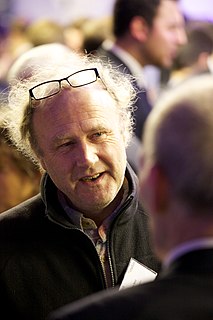A Quote by Corinne McLaughlin
Someday our grandchildren will very likely look back at the individual, selfish control of the wealth of the world by a small elite the same way we view slavery today.
Related Quotes
A half century from now, our grandchildren are likely to look back at the era of mass employment in the market with the same sense of utter disbelief as we look upon slavery and serfdom in former times. The very idea that a human being's worth was measured almost exclusively by his or her productive output of goods and services and material wealth will seem primitive, even barbaric, and be regarded as a terrible loss of human value to our progeny living in a highly automated world where much of life is lived on the Collaborative Commons.
Centuries from now our great-great-great-grandchildren will look back at us with amazement at how we could allow such a precious achievement of human culture as the telling of a story to be shattered into smithereens by commercials, the same amazement we feel today when we look at our ancestors for whom slavery, capital punishment, burning of witches, and the inquisition were acceptable everyday events.
The energy crisis has not yet overwhelmed us, but it will if we do not act quickly. It's a problem that we will not be able to solve in the next few years, and it's likely to get progressively worse through the rest of this century. We must not be selfish or timid if we hope to have a decent world for our children and grandchildren. We simply must balance our demand for energy with our rapidly shrinking resources. By acting now we can control our future instead of letting the future control us.
It is important that when pursing our own self-interest we should be 'wise selfish' and not 'foolish selfish'. Being foolish selfish means pursuing our own interests in a narrow, shortsighted way. Being wise selfish means taking a broader view and recognizing that our own long-term individual interest lies in the welfare of everyone. Being wise selfish means being compassionate.
Some time ago a little-known Scottish philosopher wrote a book on what makes nations succeed and what makes them fail. The Wealth of Nations is still being read today. With the same perspicacity and with the same broad historical perspective, Daron Acemoglu and James Robinson have retackled this same question for our own times. Two centuries from now our great-great- . . . -great grandchildren will be, similarly, reading Why Nations Fail.
If the layman cannot participate in decision making, he will have to turn himself over, essentially blind, to a hermetic elite. ... [The fundamental question becomes] are we still capable of self-government and therefore freedom? Margaret Mead wrote in a 1959 issue of Daedalus about scientists elevated to the status of priests. Now there is a name for this elevation, when you are in the hands of-one hopes-a benevolent elite, when you have no control over your political decisions. From the point of view of John Locke, the name for this is slavery.
Pessimism is a very easy way out because it is a short view of life. If you look at what is happening around us today, you can't help but feel that life is a terrible complexity of problems. But if you look back a few thousand years, you realize that we have advanced fantastically. If you take a long view, I do not see how you can be pessimistic about the future of mankind.
We need a program of psychosurgery for political control of our society. The purpose is physical control of the mind. Everyone who deviates from the given norm can be surgically mutilated. ... The individual may think that the most important reality is his own existence, but this is only his personal point of view. This lacks historical perspective. Man does not have the right to develop his own mind. This kind of liberal orientation has great appeal. We must electronically control the brain. Someday armies and generals will be controlled by electric stimulation of the brain.
Our enthusiasm for digital technology about which we have little understanding and over which we have little control leads us not toward greater agency, but toward less...We have surrendered the unfolding of a new technological age to a small elite who have seized the capability on offer. But while Renaissance kings maintained their monopoly over the printing press by force, today's elite is depending on little more than our own disinterest.
A day will come when our children and grandchildren will look back and they'll ask one of two questions. Either they will ask: "what in God's name were they doing?" or they may look back and say: "how did they find the uncommon moral courage to rise above politics and redeem the promise of American democracy?"
People who write about issues like poverty or terrorism are a part of the elite, and the distance between the elite and nonelite is growing very fast. You can move around the world but meet only people who speak your language, who share the same ideas, the same beliefs, and in doing so you can lose sight of the fact that the vast majority of the world does not think or believe in or speak the everyday discourse of the elite.
A life of stasis would be population control, combined with energy rationing. That is the stasis world that you live in if you stay. And even with improvements in efficiency, you'll still have to ration energy. That, to me, doesn't sound like a very exciting civilization for our grandchildren's grandchildren to live in.



































